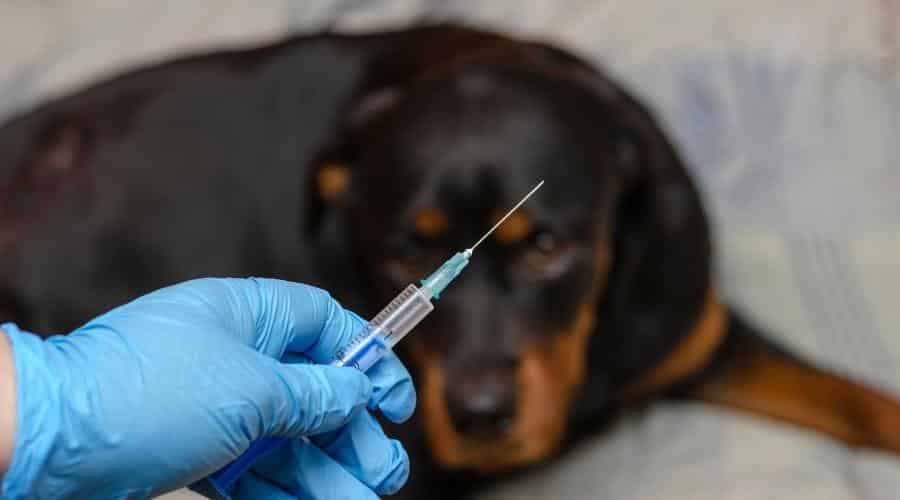Allergy Shots For Dogs: Cytopoint, Immunotherapy, Cost, Side Effects & More
When you purchase through links on our site, we may earn a commission. Here’s how it works.

Allergies can be as frustrating for dogs as they are for humans. However, there are a lot of excellent options for treatment, including allergy shots for dogs. This effective treatment can help give your pup some relief and, in some cases, even cure him. I’ll give you all the information you need to work with your vet to make the right allergy treatment decision for your furry friend.
Table of Contents
Types Of Dog Allergy Shots
Can dogs get allergy shots? Yes, vets use allergy injections for dogs to help deal with itchy allergy symptoms and teach a dog’s immune system to tolerate allergies. You may have heard about dog allergy shots but don’t know much more.
The most common anti-itch shot for dogs is Cytopoint. This shot for itchy dogs is not a dog allergy vaccine; it simply helps stop the itch. Your vet may recommend immunotherapy. This dog shot for allergies can help make your dog less vulnerable to allergens and possibly entirely eliminate them.
Cytopoint Allergy Shot For Dogs
The dog allergy shot Cytopoint treats dogs with skin reactions to allergens or atopic dermatitis. One injection reduces itching within 24 hours and offers relief for four to eight weeks in most dogs. Some dogs may need year-round treatment with Cytopoint, while other dogs may only need Cytopoint for seasonal allergies.
How does it work? The Cytopoint allergy shot for dogs is a biological therapy that acts like your dog’s immune system. It has engineered monoclonal antibodies that are similar to the ones your dog naturally makes. These specific antibodies neutralize a protein that causes your dog’s body to itch, reducing scratching and allowing the skin to heal. The Cytopoint shot for dog allergies can be a helpful tool in your pup’s allergy treatment plan.
Immunotherapy For Dog Allergies
Immunotherapy allergy shots for dogs are another way to treat allergies. With this type of treatment, a vet injects small amounts of what the dog is allergic to, increasing the dose slowly so the dog can learn to tolerate the allergen. The goal is to reduce medication and the need for symptom management until it’s no longer needed. However, immunotherapy only treats environmental allergies, like pollen, molds, and mites, and won’t work for food allergies or flea bite allergies.
How Effective Are Dog Allergy Shots?
Results will vary for each pup, but allergy shots for dogs can be very effective.
Immunotherapy
According to Dr. Scott Miller, an intern in small animal dermatology at the University of Illinois Urbana-Champaign, when it comes to immunotherapy, “Overall, 60 to 80 percent of dogs with environmental allergy will respond very well to allergy shots, often eliminating the need for other medications the pet may have been given to control signs.” He also said, “Young dogs may respond better to immunotherapy than do older dogs.”
Cytopoint
UW Veterinary Care at the University of Wisconsin-Madison weighs in on Cytopoint’s effectiveness by saying, “Cytopoint does not work for every dog, but we estimate it helps in about 75% of cases. In some cases, the itch relief is dramatic and long-lasting; in others, it helps more modestly and/or may not last as long.”
Side Effects Of Allergy Shots For Dogs

You may be wondering what your dog’s reaction to allergy shots will look like. Each dog will have a different response; however, most dogs tolerate them well, even in long-term use. With Cytopoint injections and other allergy shots, side effects are possible and may include:
- Diarrhea
- Vomiting
- Lethargy
- Redness or swelling at the injection site
- Swelling of the face
Check with your vet immediately if you notice any side effects, as they may be a sign of a severe allergic reaction, and may need immediate medical attention. It’s important to note that with immunotherapy, allergy symptoms could worsen temporarily. This is because your pup is being injected with allergens. This additional exposure could heighten symptoms.
How Much Do Dog Allergy Shots Cost?
So, how much are allergy shots for dogs? Your location, your vet’s pricing, and the size of your dog can all affect the cost of allergy shots. The cost of living differs in different places, and dosing depends on weight, so small dogs vs large dogs need different amounts, which can affect the price.
On average, immunotherapy can cost between $65 and $150 per month. However, keep in mind these costs aren’t ongoing because immunotherapy differs significantly from Cytopoint — and it’s not needed over the long term.
According to Barron’s Magazine, an annual regimen of Cytopoint could run you $1,200 to $2,400 per year, depending on several factors, including your pup’s size and the frequency of injections.
However, keep in mind that these costs are only for the injection and don’t factor in your vet office visit and other charges. Your vet will determine the number of injections your pup will need, and they may also have additional costs for your allergy treatment plan.
Allergy Symptoms

There are a few ways to determine if your dog has allergies. First, does your dog have allergy symptoms? Some common symptoms include:
- Biting or gnawing at the skin
- Chronic ear infections
- Constant licking
- Diarrhea
- Excessive itching
- Hives or rashes
- Itchy ears
- Itchy, runny eyes
- Red, inflamed skin
- Sneezing
- Swelling of the face, ears, lips, eyelids, or earflap
- Vomiting
Does My Dog Need Allergy Shots?
If you’ve tried dog allergy supplements or a change in diet, and nothing’s working to ease your pup’s symptoms, your vet may recommend allergy testing. Veterinarian testing involves either a blood test or skin testing.
Intradermal (Skin) Testing
Considered the “gold standard” in dog allergy testing, an intradermal or skin test involves an injection of a small amount of a potential allergen under the skin’s surface. After about 20 minutes, the area is examined for a reaction at the site.
Large areas of your dog’s coat must be shaved to allow the injection sites to be monitored for a reaction. Three things to note with intradermal testing: (1) your dog will need to be anesthetized; (2) it’s only performed by veterinary dermatologists, who may not be available in your area; and (3) the test may be expensive.
Serum Allergy Testing
Vets can also conduct a blood test if they suspect that your dog has allergies. The serum from your dog is tested for sensitivity to a variety of potential allergens, including dust, pollen, fungi, dust mites, and common ingredients found in dog food. No anesthesia or shaving of the injection area is needed. However, blood tests can be less precise than skin tests and are also prone to false positives.
You can also use a dog allergy testing kit to help you determine the cause of the allergy. See my reviews of the best at-home dog allergy tests to learn more about how they work. However, your best course of action is to visit your veterinarian to get a proper diagnosis, and you can share your at-home testing results with your vet.
Other Dog Allergy Treatments
Allergy shots for dogs with skin allergies are not the only answer. See my reviews of the best allergy medicine for dogs, including Apoquel for dogs. Learning more about all the options can give you the information you need to feel informed. Then you can work with your vet to understand the pros and cons and other options that might work best for you and your dog.
Frequently Asked Questions
Here are some of the most common questions pup owners have about allergy shots for dogs. If you don’t see yours here, please ask us in our comments.
Are Allergy Shots Worth It For Dogs?
For many dogs, Cytopoint allergy shots are certainly worth it to give them long-term relief from itching and other symptoms — and can drastically improve their quality of life. If your pup’s allergies are relieved through immunotherapy, it can make a huge difference. Environmental allergies can be progressive and worsen as your dog ages.
Will Immunotherapy Cure My Dog’s Allergies?
Unfortunately, in some cases, the answer is no. Immunotherapy can help with the current allergies your dog is experiencing, but many dogs who suffer from allergies develop additional allergies throughout their lifetime. This situation could mean that your pup needs to undergo additional testing later in life.
How Long Does A Dog Allergy Shot Last?
Cytopoint relief starts as early as one day after injection and can last anywhere from 4-8 weeks. You and your vet can work together to determine an ideal schedule for how your pup responds to this highly effective allergy shot.
Easing The Cost Of Care
Testing for and treating allergies can be very expensive. So, you may want to consider getting pet insurance while your dog is still young and healthy to cover unexpected conditions, illnesses, and accidents. We have pet insurance reviews for each major U.S. insurer, including pros, cons, discounts, and links to our individual reviews for more in-depth information.
Why Trust Canine Journal?
Sally has over 20 years of experience in human health sciences communications, including 10 years as an expert on pet health conditions and treatment. She’s part of a team of dedicated canine professionals and long-time dog owners at Canine Journal. We test and research the best pet products, not only for our own pups but for all of our readers.



